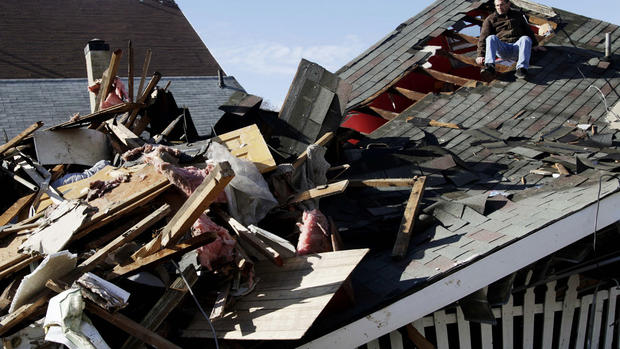Staten Island resident battles cold to keep her home
(CBS News) STATEN ISLAND, N.Y. -- A striking image on the cover of New York Magazine shows an aerial photo of most of Lower Manhattan blacked out on Oct. 31.
Nearly all of the power is back in that part of the city, but not in the borough of Staten Island.
As water started rushing through Danielle Valitutto's home in Staten Island -- through the back door, through the windows and pouring over the sink -- she had one thought as she tried to get out the door.
"Please don't let me drop my kids, please don't let me drop my kids," she recalled.
Superstorm Sandy's victims brace for new storm
NYC Marathon runners help with relief efforts
Falling temps add to urgency of Sandy recovery
Valitutto has spent every night since Sandy sleeping in her damaged home. At least her kids, Destiny and Isiah, are now staying with her brother in Maryland.
"Sandy took everything else," she said. "I'm not giving her my home."
Her house is close to her job, which she cannot afford to give up.
Floodwater filled the first floor. Volunteers have helped her strip out everything, including the soggy drywall.
"Now this is my living room, emptied out, gutted, no ceiling," Valitutto said. "It's freezing in here. Sometimes I put my lighter up to my hands to try to stay warm."
She's had to leave her windows open to dry out the place. Upstairs, she can lock herself in.
"Blankets, blankets, blankets - I have the clothes over there," she said, motioning to a pile of garments. "I just throw everything on top of me that's possible."
Last night, her flashlight barely pierced the darkness. Her street was filled with unfamiliar shadows, and her neighbor was burglarized twice.
Valitutto's car is a refuge, but gas is hard to come by so turning on the heater is a short-lived luxury.
"If we didn't have looters, I'd feel more comfortable," she said. "But you can't even feel comfortable because you have people coming back trying to rob whatever you have left."
Her waitress job provides a little heat and a glimmer of hope.
"My head is not all here, my head is everywhere else," she said, "But, I have to work. I need the income coming in so at least I can find a place to stay until the house is ready."
After work today, Valitutto met with representatives from FEMA who told her she'd have to wait seven to 10 days to hear whether they'd reimburse her for two months of temporary housing. She told us she didn't know what she'd do after that.


